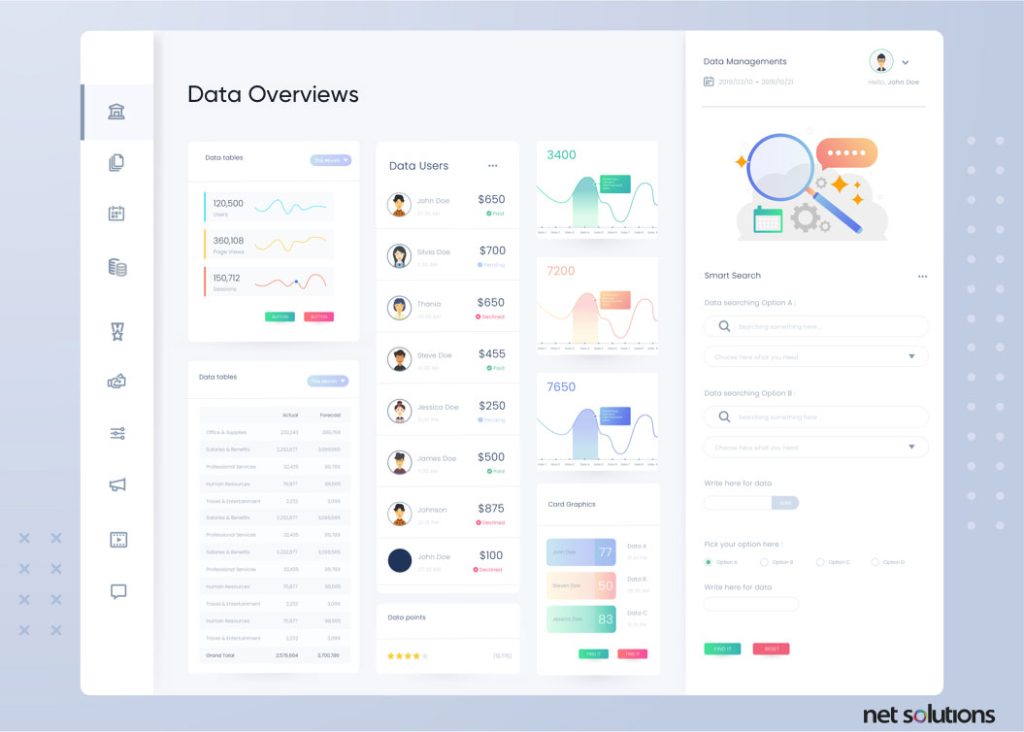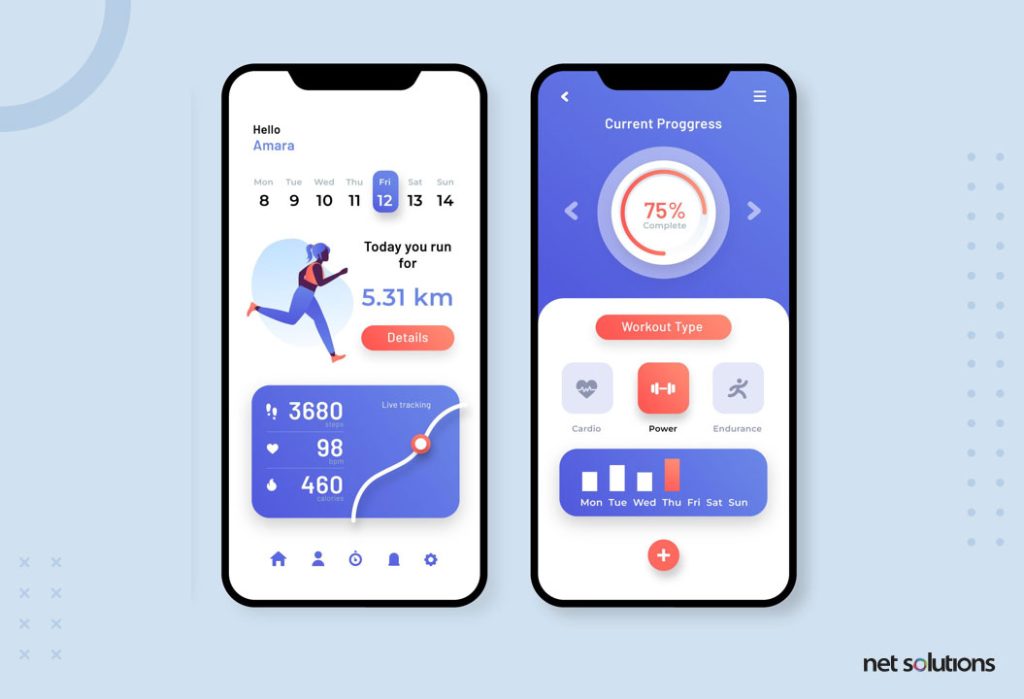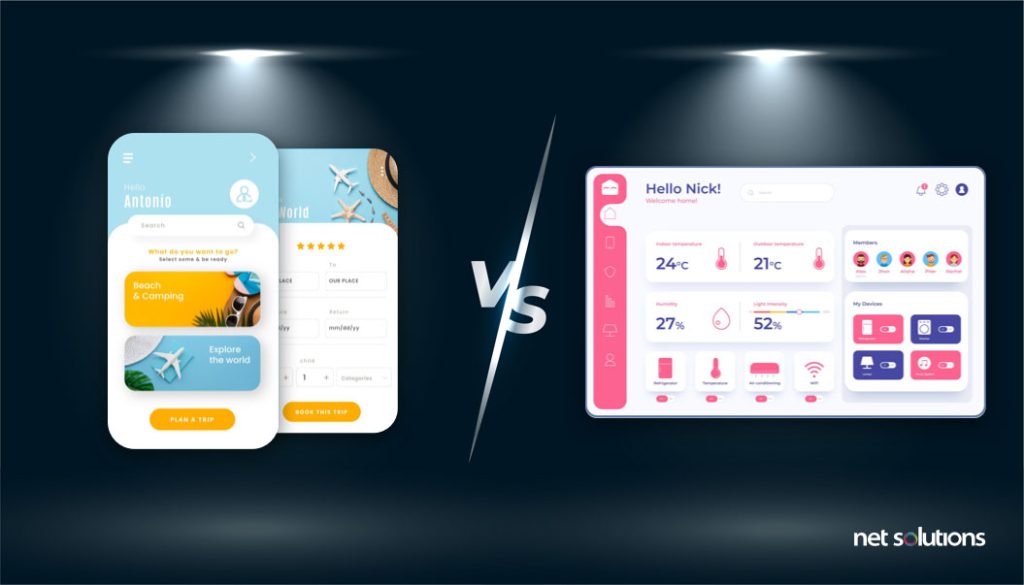Mobile apps and web apps might sound like the same thing, but they’re not. They’re so different that they have unique design and development processes, so it’s important to understand the differences so you can choose the right type of product for your needs.
Learn more about mobile apps versus web apps below and find out which one might be the best choice for your project.
What is a Web App?

Web apps are apps you access via an internet browser. You can use them in your browser on a desktop computer, laptop, or mobile device such as a tablet or smartphone. Well-designed web apps are responsive, which means they conform to the screen and device you’re viewing them on (just like responsive web pages). This provides some flexibility for reaching users, since you don’t have to worry about what device they’re on.
Web apps don’t have to be downloaded, so they don’t take up space on a person’s device. However, that does mean the user has to be connected to the internet and inside a browser (such as Chrome, Edge or Safari, among others) to use the app functionality.
What is a Mobile App?

Mobile apps are downloaded and installed onto a mobile device. They have to be designed for a specific platform — typically Android or iOS. When a user downloads them onto their device, they may gain access to system resources on that device. For example, if you download a photo editing app, you probably have to give it access to phone galleries or cameras to do anything with it.
The program that drives a mobile app resides and runs on the device it’s downloaded onto. That means it takes up storage space and power. However, depending on the app, not all of the data and functionality is on the device. Take Instagram, for example. The functional parts of the app are on the device, but the data — the millions of posts and captions — are on Instagram’s servers. You have to be connected to the internet to see that information.

We respect your privacy. Your information is safe.
Pros and Cons of Mobile vs. Web Apps

To understand which option is best for your development needs, you should look at how they stack up in some important categories.
The Cost of Development
While the specifics differ by development project, web apps are typically less expensive overall than mobile apps. That’s due in part to the fact that mobile apps can be platform specific, requiring special coding skills and launch processes. Maintenance costs are also typically lower for web apps because they have a common code and you don’t have to worry about sending out updates or working with disparate instances of the app on everyone’s devices. The app itself sits in one place on the web and people access it via that connection.
Time to Market for the App
Web apps are also usually faster to develop than mobile apps, especially if you want to ensure the widest range of users. If you want users on Apple and Android devices to have access to a mobile app, you have to develop it separately for both platforms. Even if you can leverage cross platform development, the apps must be packaged and launched separately. With a web app, you only have one job to get done. Once it’s launched, everyone can use it.
Ease of Use for Consumers
In most cases, a mobile app is more friendly for your users. Some reasons why mobile apps are better for end-users include:
- Many of them can work offline. Even with something like Instagram, which is heavily reliant on the cloud, users can create drafts and save them for publishing later if they don’t have an internet connection. A true web app only works when the user is online.
- Web apps are typically slower and depend heavily on the quality of someone’s internet connection.
- Generally, mobile apps are capable of supporting more advanced features than web apps.
Ability to Connect With Users
When it comes to making people aware of your app, mobile is generally better in most cases. That’s because these apps can be found on the app store by searching for relevant keywords. If you’re offering a fitness app to help people plan their workouts, for example, your app might show up for anyone looking for exercise, health, workout or fitness apps in the app store or even on Google.
Web apps are less discoverable. They don’t get listed in these types of marketplaces, so you have to do all the work to drive traffic to your site and encourage app use.
In some cases, this factor is not something that matters. For example, if you’re building an app that you’re offering to all new customers or patients, you might offer the app as part of your onboarding process. A web app would be fine in this scenario, because you don’t care if the general public can find the app.
Tips for Choosing the Right App for You

If you’re still not sure whether you need a mobile app or a web app, consider taking the following steps.
- Create a quick draft of basic business requirements for the app. List out what you want the app to do and why. Include some information about who you hope will use the app and how they will find out about it. Take those details and compare them with the pros and cons above to see which type of app best supports your needs.
- Talk to your in-house tech teams. Find out what your resources are and how well a web app might be supported. If you don’t have the capability to support a web app or integrate it with your site, you may want to opt for mobile.
- Reach out to experts. Use the contact button above to get in touch with Net Solutions. Our app dev teams are happy to listen to your business requirements and goals and help you understand which path might be right for you and how we can help you develop an app that drives revenue and customer satisfaction.
In the end, the question of whether to develop a mobile app or a web app will be a situational one. Make sure to be thorough in teasing out which solution will work best for your users.



